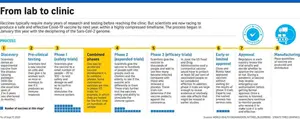Makers of the leading Coronavirus vaccine candidates have disclosed detailed information about their pivotal late-stage clinical trials and how they plan to gauge the safety and effectiveness of their shots.
The moves by first Moderna, and then afterwards by Pfizer and its partner BioNTech, follow increasing worry that the effort to develop a COVID-19 vaccine is becoming politicised, and that an inoculation could be rushed to market before it's proven safe and effective.
Moderna released its plan ahead of an early Thursday morning investor meeting.
The Cambridge, Massachusetts-based biotechnology company chose to share its full trial design to create public confidence that it's doing everything it can to ensure a vaccine works and will not cause harm, said chief executive officer Stephane Bancel.
The move resulted in a snowball of information that is not often available to the public and broader science community.
Pfizer soon followed Moderna, publishing its trial design in the form of a 137-page document that details under what circumstances the trial could generate early efficacy results. AstraZeneca afterwards shared its own plans on its website as well.
While the broad outlines of major drug trials are available on a US government website, details of how and when monitoring boards overseeing the trials plan to analyse data are often kept confidential by pharmaceutical companies.
However, the unprecedented push to get a vaccine to market quickly has increased interest in those details.
The analysis of findings and what the rules are for stopping a trial if there are encouraging early signals could determine how quickly a shot receives emergency authorisation from US regulators.
"We've been working nine months to try to stop this virus by getting a vaccine to market," Mr Bancel said in an interview.
"We want to make sure the public has trust in vaccines by being transparent."
Mr Bancel said the most likely scenario was that Moderna's vaccine could generate preliminary efficacy data in November.
It's "technically possible" for Moderna to get results next month, but this is unlikely, Mr Bancel said.
Under the Moderna plan, a data monitoring board will take a preliminary look at the efficacy results after 53 participants have contracted the coronavirus, and again after 106 cases are reached. The final analysis will occur after 151 cases, according to slides from the investor meeting.
Moderna's plan is more conservative than the 32-case benchmark being used by Pfizer for its first preliminary analysis of the Covid-19 vaccine it's developing with Germany's BioNTech.
Additional efficacy analyses will take place when the companies identify 62 and 92 cases. Pfizer has said that conclusive efficacy results are likely by the end of next month.
Dr Eric Topol, the editor-in-chief of Medscape and a professor of molecular medicine at The Scripps Research Institute, wrote in an e-mail that "aggressive" would be "too kind" a way to describe the trial design, which "has the optics of wanting (engineering) the trial to stop early, which is not good".
The unprecedented push to get a vaccine to market quickly has increased interest in those details. The analysis of findings and what the rules are for stopping a trial if there are encouraging early signals could determine how quickly a shot receives emergency authorisation from US regulators.
Mr Bancel said "it's extremely unlikely" everyone in the country could get vaccinated by the end of the first quarter of next year, as a Trump administration official suggested on Wednesday.
There will likely only be enough vaccines approved for every American who wants a shot by the second half of next year, according to Mr Bancel.
BLOOMBERG
